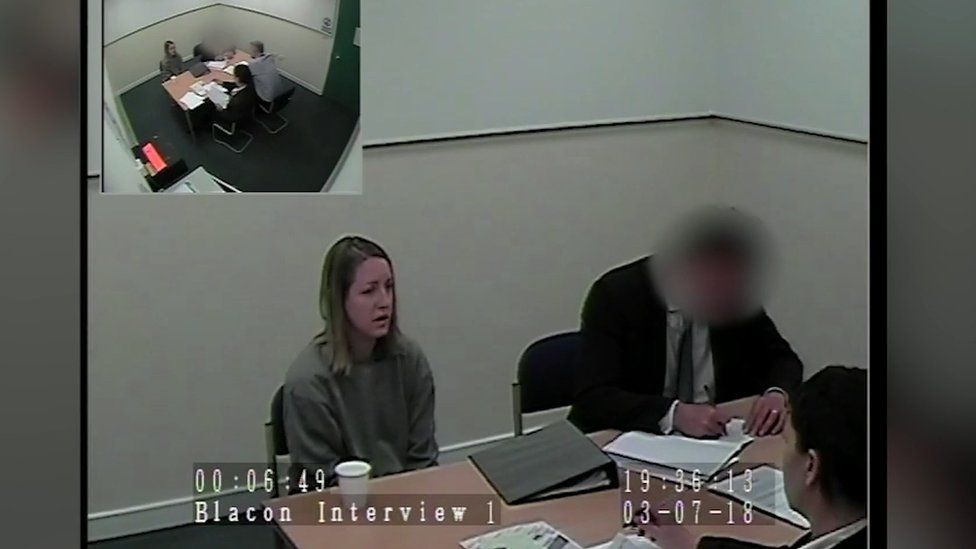
The mother of two of Lucy Letby’s victims said her refusal to appear for sentencing was “just one final act of wickedness from a coward”.
In statements read to the court, the victims’ families said they felt disrespected by her absence.
Calls are growing for the government to change the law to compel convicts to attend sentencing.
Rishi Sunak said it was “cowardly that people who commit such horrendous crimes do not face their victims”.
Letby murdered seven babies and tried to kill six more while working at the Countess of Chester Hospital neonatal unit between 2015 and 2016.
The 33-year-old’s case is the latest in a series of high-profile trials where convicted murderers have refused to turn up, including the killers of Zara Aleena in London and nine-year-old Olivia Pratt-Korbel in Liverpool.
The mother of Child E, who died, and Child F, who survived, told the court that Letby has “repeatedly disrespected my boy’s memory”.
Hitting out at Letby’s refusal to attend the sentencing hearing, the woman said: “Even in these final days of the trial she tried to control things, the disrespect she has shown the families and the court show what type of person she is.
“We have attended court day in and day out, yet she decides she has had enough, and stays in her cell, just one final act of wickedness from a coward.
“I would like to thank Lucy for taking the stand and showing the court what she is really like once the ‘nice Lucy’ mask slips.
“It was honestly the best thing she could have done to ensure our boys got the justice they deserve.”
Addressing Letby’s absence from court as he sentenced her to spend the rest of her life behind bars, Mr Justice Goss said he would “deliver the remarks as if she is present to hear them” and that the 33-year-old would be sent a copy of his remarks and the victim impact statements from the families.
Baby serial killer Lucy Letby
Asked about Letby’s absence from the court room, Prime Minister Rishi Sunak said it was “cowardly” when convicts “do not face their victims and hear first-hand the impact that their crimes have had on them and their families and loved ones”.
He added that his government is looking to change the law to compel people to attend their sentencing which was something that “we’ll bring forward in due course”.
Farah Naz, Ms Aleena’s aunt, said it is vital offenders are present so that victims feel heard.
Speaking to BBC Breakfast ahead of Letby’s sentencing, Ms Naz said her family felt “disenfranchised” when Jordan McSweeney, 29, refused to attend sentencing last December after he admitted to killing Ms Aleena in Ilford, east London.
He attacked the 35-year-old as she walked home from a night out on 26 June 2022. She was later found in the early hours having been badly beaten and died later that day.
She said reading out victim impact statements in the presence of the convict is the “only time in which the victims have a part in the justice system. And we need to have a part in the justice system in order to feel heard, in order to feel some sense of retribution”.
The convicted person’s absence from court is “so far removed from that justice process, then it just feels a little farcical”, she told BBC Breakfast.
Speaking about McSweeney’s court absence, she said: “We needed to look at him and make him uncomfortable. He needed to see us, he needed to see what he did. There’s never going to be a moment in his life now where he gets to hear what he did.”
Ms Naz said she feels “sad and angry” for the families that delivered their victim impact statements in Letby’s absence.
Convicted criminals should be forced to face the victims and listen to the impact their offence had on their lives, she said.
“The power [to not attend the hearing] should be taken away. When someone murders your loved one they’re taking power, so we should take that away. It’s exactly what needs to be taken away when exercising justice,” Ms Naz added.
She suggested sentencing proceedings be played into the cell holding the criminal, with a two-way camera so that those in court could see their reaction.
Justice Secretary Alex Chalk said Letby “took the coward’s approach” by not appearing in court.
It was one last insult to her victims by “robbing their families of the chance to look her in the eye as the judge decided her fate”, he added.
“Cases like these make me even more determined to make sure the worst offenders attend court to face justice, when ordered by the judge,” he said.
The family of Sabina Nessa, who was killed in a random attack in Kidbrooke, south-east London, in 2021, were also unable to face her murderer who refused to appear at his sentencing.
Koci Selamaj, 36, was jailed for life with a minimum term of 36 years in April last year.
Speaking after the hearing, Sabina’s sister, Jebina Islam, said it was “outrageous” that Selamaj “was able to decide whether or not to come to court” and had “refused to listen to our family impact via link”.
She has been campaigning to make convicts appear in court.
Labour leader Keir Starmer said his party would close the “shamefully exploited loophole” if elected to government.
However, Kirsty Brimelow KC, chair of the Criminal Bar Association, said forcing an offender to go to court could “massively increase risk to everybody around that prisoner”.
“I think it’s unlikely to work. You should never underestimate the capability and capacity of somebody to disrupt court proceedings,” she told BBC Breakfast.








